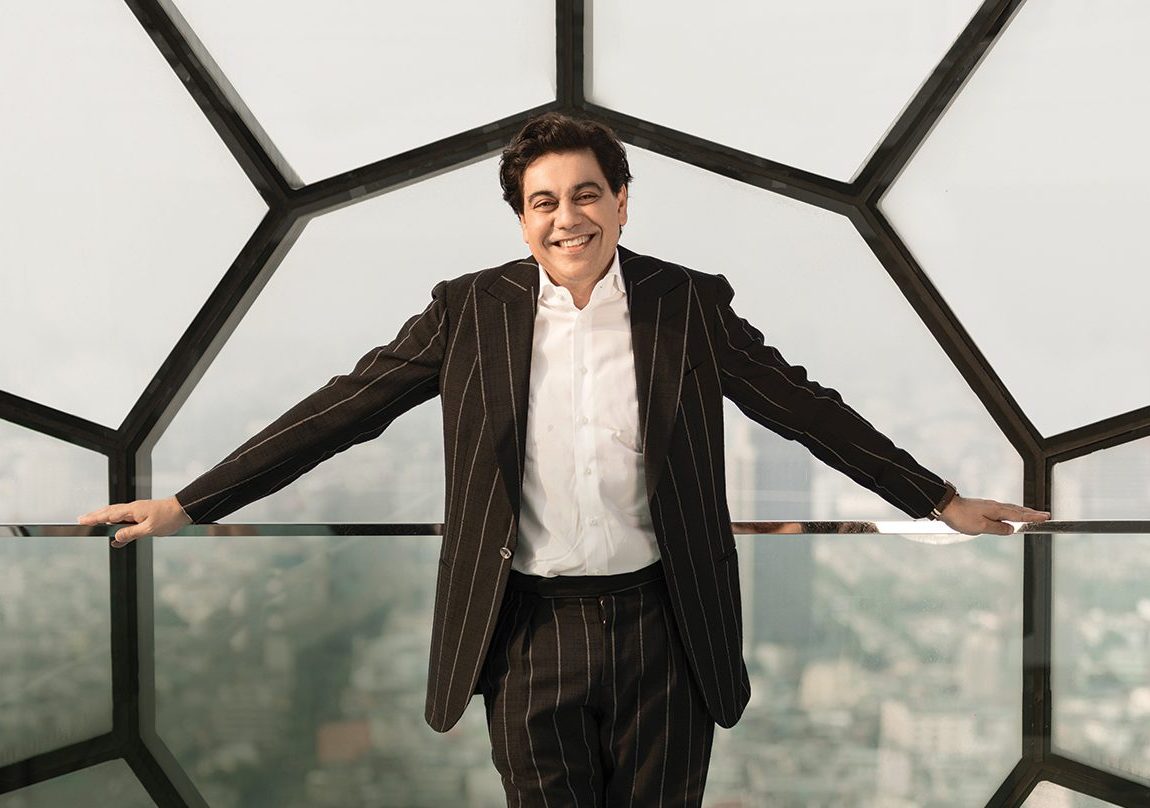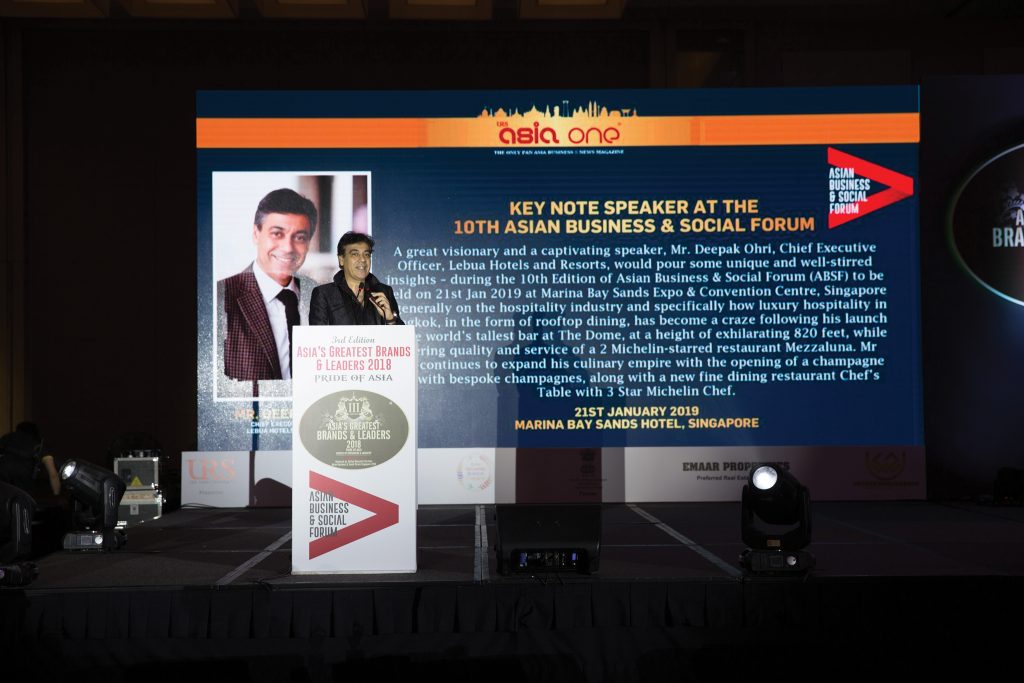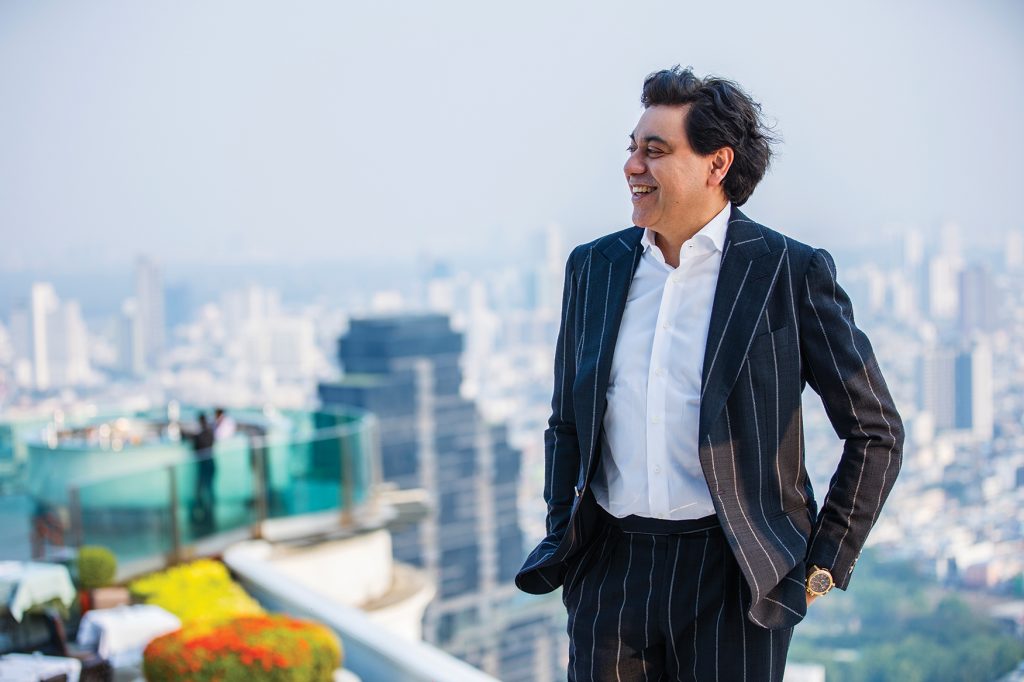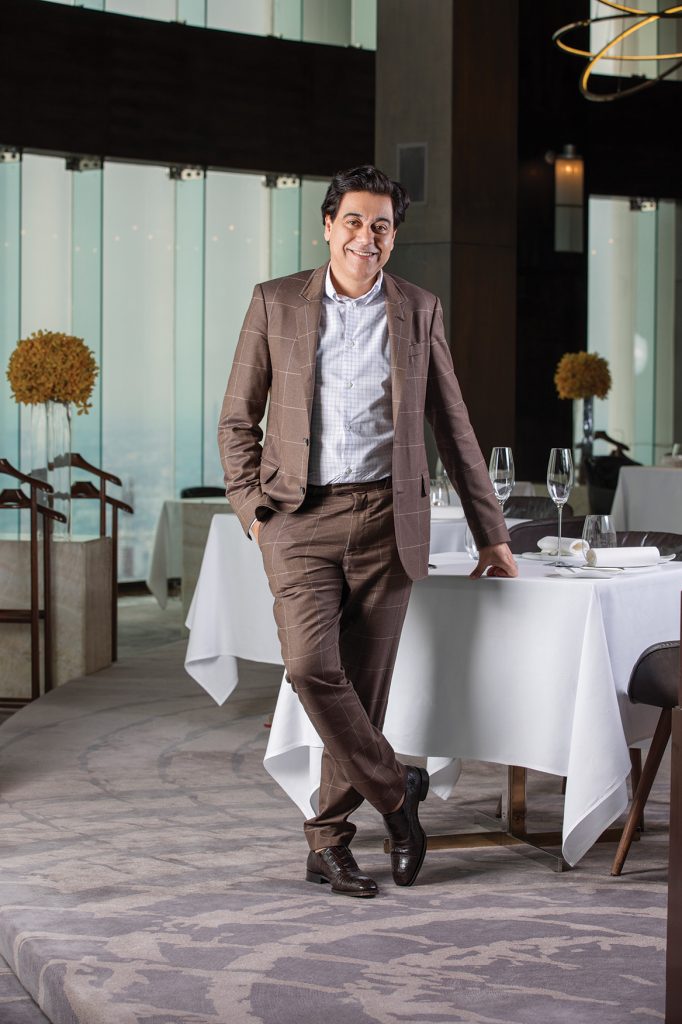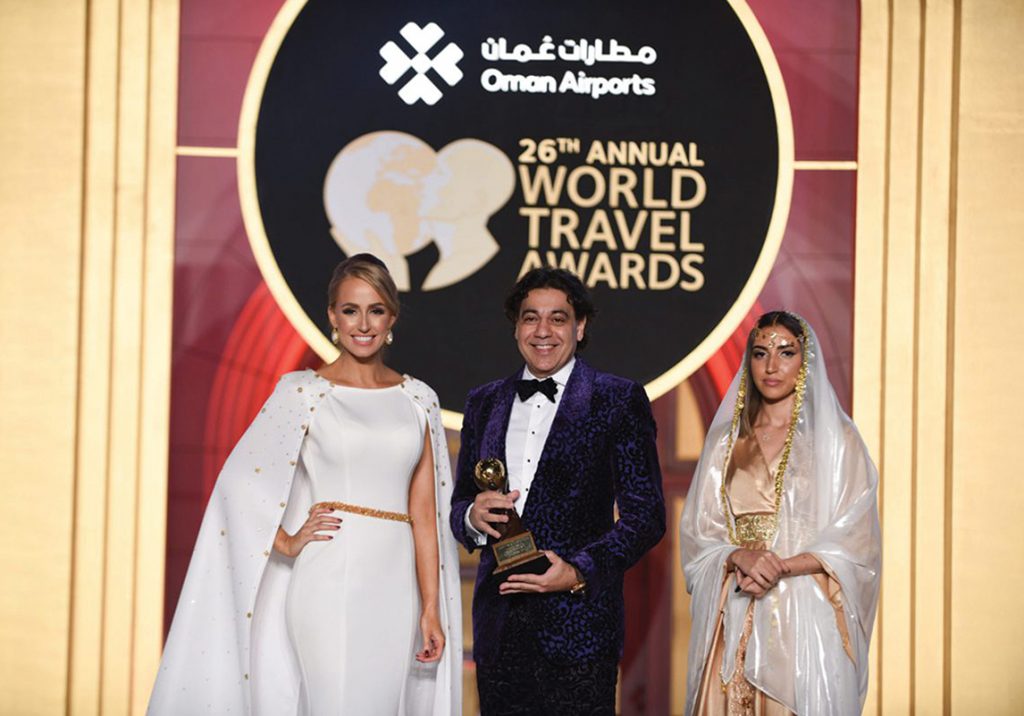How his journey was shaped by his quest for self-respect.
By Aiden Jewelle Gonzales
More than lebua at State Tower’s reputation for being the vanguard of Bangkok’s now-omnipresent and renowned rooftop bars, or being the haven of experiences the likes of which are talked about years later, in many ways the man behind its inception holds an even greater distinction. When I met Deepak Ohri, the CEO of lebua Hotels & Resorts, I’d known then that he was considered a juggernaut of the Thai hospitality industry; a visionary who had transformed an empty shell of a building into a global tour de force and one of the most recognisable landmarks in the city’s skyline. What I didn’t know but soon discovered, however, was a candour rarely found in someone of his position, and an earnestness that earned him the overt loyalty of his staff, 70-80 percent of whom, I was informed, had been with lebua since the dawn of the hotel.
A guest lecturer around the world, Deepak’s charisma lends itself to his skill as a mentor and orator, and as he pops opens a bottle of USD 2,000 Blanc de Blanc champagne, it’s clear that he has an appreciation for the finer things in life. But both, he reveals, as with many other aspects of his seemingly charmed life, were borne out of a series of failures that he’s proud to have weathered, and were a hard-earned consequence of his quest for self-respect. “I was born and raised in Lucknow, and I wasn’t very good at my studies,” he recalls. “I failed to get into any college, and by default I got into hotel management in Chennai, back when it was called Madras. There, they didn’t speak Hindi, only the local dialect and English, and at that time my English was so bad that I was often called upon to say something in English just to entertain everyone. I was a laughingstock. From then I resolved to be a good orator and earn not just their respect, but my own. I can now say with some pride that I’m a guest lecturer at a few Ivy League institutions, despite no formal education.”
His humble beginnings, however, were never forgotten and in fact he relates them to me with no small amount of eagerness: “During college, I was paid INR 20 a day to wash glasses until midnight at a place 20km away from my university, and if I broke a single glass, I wouldn’t get paid. When I first stepped on a plane, I was 21, and I didn’t even know how to fasten my seatbelt.” It’s hard to believe this of the brains behind lebua’s THB 1 million menu in 2007, what was once dubbed ‘the most expensive meal in the world’; or the man who had the enviable audacity to decline an invitation to be part of the World’s 50 Best Restaurants list. But as Deepak advises, it is these vicissitudes of fortune that have given him the drive to achieve what he has today.
With complete candour, Deepak relates the rest of his journey towards self-respect to Masala.
Tell us about the first few years of your career, and how those experiences shaped where you are now.
I first worked at The Ashok Hotel under the Indian Tourism Development Corporation (ITDC) for three years, then at the Leela Kempinski in Mumbai, then as the manager of the Royal Bengal in Singapore, the most expensive Indian restaurant back then. At that time, I’d gone for a job interview at a five-star hotel in Singapore, and the only job offered to me was as a steward, and that too a trainee steward. When asked why, my interviewer said, “you’re Indian, so working at an Indian restaurant is no big deal.” That’s when I said to myself, I’m going to open a restaurant that’s not Indian.
It’s usually how it is in my career – I decide beforehand what I’ll do, even if I don’t know how I’ll do it. What I’ve then seen is that despite certain failures, the gates of opportunity will always open, eventually. Sure enough, I soon got the opportunity to come to Bangkok and open Paulaner Brauhaus, a German microbrewery that was also a 600-seat restaurant. And it was successful! On many nights, there would be up to 800 people queueing for a seat.
From there, I jumped around a lot. I opened a Paulaner branch in Singapore, got headhunted by TGI Fridays, went to the U.S., then Indonesia, and then back to Singapore, and by that time my life had completely changed. I had a house, a two-door Mercedes convertible, and I was just 28. I was part of four successful restaurants, and I was minting money like nobody’s business.
That’s when it went to my head and I became arrogant. I was young and single, and enjoyed everything that afforded – I partied, I had a great time, and then I lost it all. My partners saw my weaknesses and cheated me, and in the end I had to go back to India.
But I’m the person I am today because I’ve seen more failures than successes, and I don’t shy away from that. I’m very proud of them – during my present- day lectures, I make sure to include my negative publicity because I want to tell the new, aspiring generation that mistakes are very important for people to be successful.
I’d learned enough from my mistakes that when I got a job at Star Cruises, as the first Indian manager of their SuperStar Leo, I left after a month because it was not the life I wanted. There every vice was readily available, I was young, I was better looking than I am now [laughs] but I knew I was looking for something else. To cut the story short, I came to work for Taj Hotels as part of the team that opened four new restaurants and the Taj Exotica Resort & Spa, Goa, and through them I got an opportunity to go to the very prestigious Indian Institute of Management (IIM). The first thing I did when I walked in was shake the hand of the security guard – I didn’t ever think I could walk into that school growing up! That’s where I realised I’d found my purpose in my life, and that I wanted stability. I’d met my now-wife Anita by then, and we got married shortly after.
What led you to lebua Hotels & Resorts?
During our honeymoon in Phuket, I took my wife to Bangkok, where I was offered the job of opening Marche International Restaurant And Beer House at President Park, which I took. There, I met the people who are now the owners of lebua. One day, they took me to an empty shell of a building, and told me they wanted me to open a restaurant. They were very passionate about it and asked me if I would do it, and what kind of restaurant I would open.
I told them I wasn’t sure, but shortly after, during a trip to Bali, my wife and I went to a restaurant called KISIK at AYANA Resort and Spa Bali (which was the The Ritz-Carlton, Bali back then), and as I was walking down the 100 steps to the restaurant, I got the idea for Sirocco. I called my boss and I told her, I’ll take the job, and the rest is history.
Why did you go with your own brand rather than franchise another existing property?
Two things: Firstly, I never believed that restaurants should be outsourced. Secondly, we wanted the lebua experience everywhere to be the same. The whole of lebua is all about software, which is where the rich content is, and that software is our people.
As you said, you started with an empty shell and turned the lebua brand into the giant it is today. What did that entail?
We approached the whole concept in a very structured and scientific matter. The first three months were hard for us, and then we did a marketing campaign that said, “Even after dark, our sky still changes colour” and after that, we never looked back. I joined the project in May 2003, and the restaurant opened in December of that year. It was the fastest project I’d done in my life. It took 100 tonnes of steel, a lot of planning, and we had to weather a lot of critics.
In fact, no designer wanted to design the place, and we ended up hiring our office designer. Everyone told us it wasn’t going to work because at that time, only three hotels in Bangkok were doing well in F&B.
When we opened Mezzaluna in 2004, again, no one believed in it. It was an Italian restaurant where, in 2004, we were already selling 30g of pasta for THB 890++. At first, everyone said that no one would come – yet here we are, 17 years later, and it’s a two Michelin-starred restaurant.
Lebua came in 2006, after our guests complained that the Bangkok traffic made it difficult for them to visit the restaurant. We converted the service apartment below, Meritus, into lebua, thus proving that people will come to a hotel solely for its F&B, if it offered the right experience.
Six bars and four restaurants later, each of your F&B outlets has won numerous global awards. What inspired you, and what made you sure they would be successful despite the naysayers?
Easy! Netflix, Amazon Prime, Bollywood, and Hollywood movies. [Laughs] No, seriously! Everything started out as a dream – I see what people like in movies, and I work towards creating that atmosphere. I could tell you I’m brilliant, or I’m a genius, but that’s not it.
What the critics don’t understand is that we are not selling food and beverages. We’re selling a story; an inspiration. For example, those who went to our THB 1 million dinner told me that it was in a way the cheapest meal that they’d had because it’s an unrivalled experience – nowhere else in the world would you get eight, 3-Michelin-starred chefs in one place, all of whom are preparing their best dish. In one evening, you’re eating food from eight different cities, five different countries, and drinking the best wines from all over the world. Most people in F&B struggle because they’re selling food and beverages. When you come to our restaurants, we sell an experience. Food and beverage are complimentary.
What do you attribute your success to?
My late father, for the values he’s instilled in me, to always stay grounded and connected to my roots. Whenever I have failed, it’s when I forgot where I started; when I got distracted. The continuation of my success is attributed to Anita, who’s supported me since I met her 23 years ago. There are some days where she won’t have seen me for three months when I’m travelling, but she’s supported me throughout.
And at the end, it’s not my success, but my team’s. When you start something new, it’s difficult to get good people to come and work for you, and when you become famous, they forget the pain that you’ve gone through to get there. My team believed in lebua from the beginning.
Most people consider you as a visionary when it comes to F&B and concept creation. You discovered Gaggan and Sühring before they were Gaggan and Sühring, do you have anything to say about that?
I think they are doing very well, and I wish them all the best, and they should always continue to do well. I’m very proud of them – it’s not that I went out looking for them and discovered them; they came to us and wanted to work for us. Gaggan was with us for a year, and Sühring for seven years.
In what ways has the hospitality industry been affected by the COVID-19 pandemic over the last year?
Pre-COVID, the hospitality industry knew that we are what we are because of our people. But when the pandemic struck, the most unfortunate thing that the hospitality industry did is to let the very same people, who are the foundation of their business, go. The economic fallout is separate, and only happened at this scale in the industry because even today, the chassis of the industry’s asset management base might be new but its engine is from 1947.
There are always possibilities, different ideas that could have been done, and the industry has forgotten that while they should have a goal of reaching the right multiple, they should also look at quality of earnings. I’m a little bit upset. It’s not an emotional statement, but it’s a fact – they should not have let their people go.
At lebua, we did not let a single employee go. The pandemic has shown how strong our foundation is, and I think the credit goes to the owners and all the employees working here, and I’m very grateful to them.
How did you manoeuver the pandemic without letting anyone go?
It’s not that it was easy for us. It’s going to be almost a year that we’ve been doing loss funding, and not many people will say that proudly, but I’m putting this on public record because we should not be shy about the difficulties that we are facing. Once we express our difficulties, our challenge is out in the open, and only then we can go out and find the solutions.
So how did we handle it? We created a council, and we told the staff, we want to keep everyone, so come up with a solution. They came up with a list of deductions, which we carried out, and in the end, everyone contributed to our survival.
What do you think the industry has learned through the recent crisis, and what permanent changes do you believe need to be made that reflect the changing times?
Many changes are taking place, and many have taken place. Some are temporary – travelling, corporate, MICE – these are temporary because business will comeback. Some people are saying fine dining will disappear, but that’s not true. When people have money, they will want the time and experiences to enjoy it.
The permanent change you’ll see is a new breed of asset management. Earlier on, the industry’s asset management was reactive – they used to ask, why has this money been spent? Now, it’s become proactive – people will look at other avenues and ask, how can we save money? Moving forward, you need asset managers who understand the operation and the customers. These customers moving forward will be Millennials and the Gen-Z generation, and that’s why I want to be the first one in the world to create a hospitality brand for the post-COVID period for those generations.
What do you enjoy most about your career?
Having champagne, and watching Netflix! [laughs] It’s being able to enjoy the things I’ve missed. For example when I was studying in Chennai, I had a roommate who had a prized CD shirt, and I used to borrow it all the time until he finally gave it to me. Now, I’m very fond of spending money on clothes! Or back in the day, my mother used to spend 200 paisa to rent a bicycle so that I could ride it for an hour because we couldn’t afford one, so I’ve bought the most expensive bike I can now.
But really, it’s the simple joys. I’ve started writing a book called A Bridge Not Too Far, about how everyone’s journey should begin with finding our reason ‘why.’ The theme of the book is based off of a quote by Mark Twain, which says, “The two most important days in your life are the day you are born and the day you find out why.” I’ve realised the ‘why’ of my journey is to be able to hold my head up high, no matter what I do. In the month of May, I’m taking a month off, and going to Phuket to finish it. The whole process of writing a book is so unbelievably soothing, it’s the best meditation that you could ever do. Hopefully, you’ll soon see it as a Hollywood movie. I’m not going to say much, but we’re creating an experience centre for this book, which will be in either Hong Kong or Singapore, depending on the production house.
Over the years, what is the one accomplishment that you are most proud of?
Staying married! Anybody else would have left me by now!
What do you believe makes a good leader, and what sacrifices does one have to make to be effective at being the head of a business?
Your team makes you a good leader – it always depends on how they support you. In the end, it boils down to choosing that team. Choosing the right people is an art, which I have perfected because I never got those opportunities in the past. People would look at my nationality, my educational background, what my parents were doing, or even where I come from in India, and make snap judgments about me, without giving me a chance.
The biggest sacrifice I’ve had to make is – there’s no such thing as a work/life balance. This May will be the first long holiday in 33 years I’ve taken. I’ve been to London more than 35 times, and I have not seen Big Ben until today. I go to meetings during the day, travel overnight by train, shower, shave, go for meetings again, and make sure I can come back early to my wife. For a certain period of time, I lost touch with my friends as I was too busy. I’d say the biggest sacrifice has been wife’s as she’s had to put up with a husband who’s away so much.
Despite not having that mythical work/life balance, you still have a range of other interests. Can you tell us about them?
Oh yes, you name it, I’ve done it, I’ve perfected it. Car racing, cycling, running, boxing, a few of the extreme sports, heli-skiing…when I was young, up till I was around 40 years old, I had what I call FOPO: Fear of People’s Opinions. Today I have no fear of people’s opinions, and it’s been so liberating and allowed me to try out whatever I want.
How involved are you in the Thai- Indian community, and what advice would you give to the next generation, many of whom are involved in the hospitality industry?
I don’t think I’m in a position to give any advice to anyone; the Thai-Indian community are doing a great job, they have given a lot of contributions to Thailand as a whole, and to the progress of the city. I’m very proud that they’ve always stood together with their fellow Thais through good times and bad. For me to give advice will be very immature, as instead I’d love to learn from them, their values, how generation after generation they continue to imbibe those values in their kids and grandkids, and how they’ve fostered such a harmonious relationship between the Thais and Thai-Indians.
The two things I would say are, don’t do the right thing, but do the brave thing. Sometimes, when you’re doing the right thing, you miss the opportunity to do the brave thing. Secondly, find out why you’re doing what you’re doing first, and the how will come.


